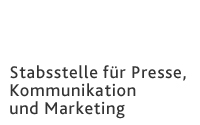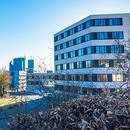Executive Department for
Press, Communication and Marketing
Adolf-Reichwein-Straße 2a Gebäude AVZ (Gebäudeteil AR-NA) 57068 Siegen
Phone: +49 (0)271/740-4915 Fax.: +49 (0)271/740-4911 E-Mail: presse@uni-siegen.de
Research on Particle Physics at the Highest Level
The German Research Foundation (DFG) is setting up a new Transregional Collaborative Research Center (TRR SFB) in physics. The University of Siegen is involved as one of three locations.
Great research success for the University of Siegen: The university is one of three sites involved in a new Transregional Collaborative Research Center of the German Research Foundation (DFG). The TRR SFB "Phenomenological Elementary Particle Physics after the Higgs Discovery" is one of ten new collaborative research centers in Germany. Starting in January 2019, it will initially be funded for four years with a total of around 12 million euros. Transregional collaborative research centers are jointly applied for and supported by two or three higher education institutions. Partners of the University of Siegen in the new TRR SFB are the Karlsruhe Institute of Technology as a speaker university and RWTH Aachen University.
"The approval of this DFG collaborative research center is a great success for the University of Siegen. I congratulate the school, the field of physics and in particular the spokesman of the team, Prof. Dr. Thomas Mannel," says university rector Prof. Dr. Holger Burckhart. The new SFB contributes to sharpening the university's research profile, emphasizes the Vice-Rector for Research and Young Researchers, Prof. Dr. Peter Haring Bolívar: "For the first time, the University of Siegen has two Collaborative Research Centers at the same time. This shows that the path we have taken to consistently profile our research activities is successful."
In the TRR SFB "Phenomenological Elementary Particle Physics after the Higgs Discovery", the scientists continue to investigate the question of what the universe is made of. Starting point is the standard model of particle physics, which describes nature in all its details. The model was completed by the discovery of the "Higgs particle" at CERN in 2012. However, it does not answer all the fundamental questions - for example, it does not provide an explanation for cosmological phenomena such as the existence of the so-called "dark matter" or the "dark energy," says the physicist and Siegener co-speaker of the SFB, Prof. Dr. med. Thomas Mannel: "We know from cosmological observations that there is dark matter and also the phenomenon of dark energy. However, so far we can neither prove it on earth nor explain it through the standard model of particle physics. Here we would like to start from the theoretical side and develop a further reaching phenomenology. "
Already in 2013, the research group "Quark Flavor Physics and Effective Field Theories" was approved at the University of Siegen in the field of theoretical particle physics, funded by the DFG. It focuses on the so-called "Flavor Physics", that is, the research of the transitions between different particle types. The location of Siegen is a global leader in this area, says Prof. Mannel: "The research group has done the crucial preliminary work to become the site of a special research area. I am very pleased that we can now continue our research as part of a high-level consortium with colleagues from Karlsruhe and Aachen."
In terms of content, the work of the new TRR-SFB is directly linked to the worldwide flagship project of particle physics, the particle accelerator LHC (Large Hadron Collider) at CERN. In this largest accelerator ring, physicists collide protons, which subsequently break down into tiny components, searching for new phenomena beyond the standard model. The researchers from Karlsruhe, Aachen and Siegen want to contribute fundamental theoretical aspects here in the coming years, which are indispensable for the success of the current major particle physics projects. At the center of the research program are precise theoretical predictions for the interpretation of measurements at the LHC as well as the development of new indirect methods for the search for physics beyond the standard model.
Contact:
Prof. Dr. Thomas Mannel (Co-Coordinator at the Siegen location)
Tel.: 0271-740 3840
E-Mail: mannel@hep.physik.uni-siegen.de


